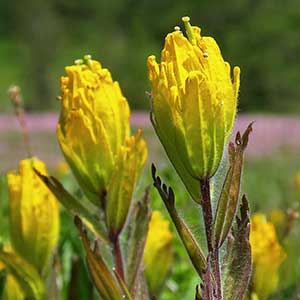Castilleja levisecta
Castilleja hispida
golden Indian paintbrush, golden paintbrush
harsh Indian paintbrush, harsh paintbrush, hispid or harsh or bristly paintbrush
few to many, erect, ± decumbent or creeping at base, unbranched, sometimes branched, hairs spreading, medium length and long, soft, mixed with short stipitate-glandular ones.
few to many, erect or ascending, unbranched, sometimes with inconspicuous, short, leafy axillary shoots, hairs spreading to erect, long, soft to stiff, mixed with shorter stipitate-glandular ones.
green to purple or brown-tinged, linear-lanceolate proximally, oblong-ovate or -obovate distally, 0.8–5.2 cm, not fleshy, margins plane, distalmost sometimes ± wavy, involute, 3–7(–11)-lobed, apex obtuse;
lobes erect to ascending, linear to linear-spatulate, very short, toothlike, usually arising from distal 1/3 of blade, apex rounded.
green, sometimes purple-tinged, margins sometimes red-brown, linear or narrowly to broadly lanceolate to narrowly oblong, oblanceolate, or ovate, 1–8.5 cm, not fleshy, margins plane or wavy, involute or flat, (0–)3–5(–7)-lobed, apex acute to rounded or acuminate;
lobes ascending, linear to narrowly lanceolate, much narrower than mid blade, apex acute to rounded.
2.5–25 × 1–4 cm;
bracts bright yellow throughout, or proximally greenish, distally bright yellow, sometimes deep yellow-orange, especially with age, oblong, elliptic, or obtuse to ovate, (0–)5–9(–13)-lobed, sometimes wavy-margined;
lobes erect to ascending, oblong, short to medium length, arising above mid length, central lobe apex rounded, lateral ones rounded to acute.
3–16(–30 in fruit) × 2–5 cm;
bracts proximally greenish to dull reddish purple, distally red to orange or yellow, sometimes crimson, scarlet, orange-red, red-orange, or burnt orange, often becoming paler and/or duller with age, lanceolate to oblong, ovate, or obovate, 3–5(–11)-lobed;
lobes spreading to ascending, linear to oblong or narrowly lanceolate, medium length or long, arising at or above mid length, central lobe apex obtuse to rounded or truncate, sometimes emarginate, truncate, or acute, lateral ones acute to obtuse.
straight or slightly curved, 17–28 mm;
tube 12–15 mm;
beak exserted, adaxially green or greenish yellow, 6–8 mm;
abaxial lip yellow or greenish, reduced, not inflated, 2–3 mm, 25–33(–50)% as long as beak;
teeth ascending to erect, yellow, 0.5–1.5 mm.
slightly curved, 17–38 mm;
tube 12–18 mm;
beak exserted, adaxially green, sometimes yellowish, rarely red-brown, 9–20 mm;
abaxial lip ascending, deep green, reduced, curved, 0.5–3 mm, to 10–33% length of beak;
teeth incurved, reduced, green, 0.5–1.2 mm.
distally yellow, 13–22 mm;
abaxial and adaxial clefts 4–9.5 mm, 30–40% of calyx length, deeper than laterals, lateral 2.5–4.5 mm, ca. 25% of calyx length;
lobes linear to narrowly oblong or narrowly lanceolate, apex obtuse, sometimes rounded to acute.
colored as bracts, sometimes with a yellow band proximal to red to orange apices, or ca. 1/2 yellowish and 1/2 reddish, 12–35 mm;
abaxial and adaxial clefts 7–12 mm, 33–65% of calyx length, deeper than laterals, lateral 2–7 mm, 15–30% of calyx length;
lobes triangular, linear, or oblong to lanceolate, apex acute or obtuse to rounded.
= 24.
= 24, 48, 96.
Castilleja levisecta
Castilleja hispida
Castilleja levisecta is listed as threatened in the United States and endangered in Canada, where it is extremely rare. Most of its grassland habitat has been altered by development in the Puget Trough, and there are historical stations in the metro areas of what are now Victoria, Portland, and Seattle. For several decades, C. levisecta was considered extirpated from Oregon. However, recent reintroduction programs in Oregon and Washington have been very successful at reestablishing this species at several sites in the Willamette Valley. The bright yellow inflorescences often gradually age to a golden yellow color, unique in the genus.
Castilleja levisecta is in the Center for Plant Conservation’s National Collection of Endangered Plants.
(Discussion copyrighted by Flora of North America; reprinted with permission.)
Varieties 2 (2 in the flora).
Castilleja hispida is likely related to C. chromosa, which replaces it geographically to the southeast.
(Discussion copyrighted by Flora of North America; reprinted with permission.)
1. Leaves (0–)3–5(–7)-lobed; calyx lobe apices obtuse to rounded; lateral calyx clefts 2–7 mm; Cascade Range and west to coast. | var. hispida |
1. Leaves 0–3(–5)-lobed; calyx lobe apices acute; lateral calyx clefts 4.5–7 mm; e slope of Cascade Range to Alberta. | var. acuta |


